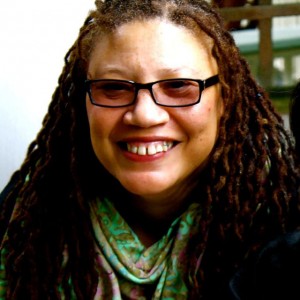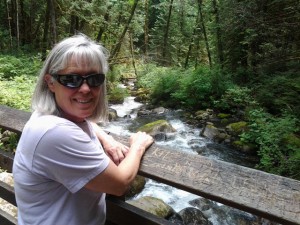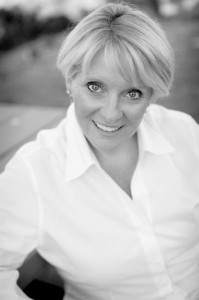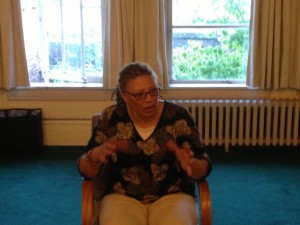Traumatized Women Open Hearts Through
Meditation At Purdy Prison for Women
Written by: Tuere Sala

The Washington Corrections Center for Women, in Gig Harbor, Wash., houses more than 700 women.
Photos: Brandon Huggins, Tuere Sala, Washington state Department of Corrections
Sitting still and quiet with one’s eyes closed can be very difficult for all meditators, given the nature of the thinking mind. For people living with trauma, sitting for even five minutes can be tortuous.
As an offering, to support people with trauma who want to practice mindfulness meditation, three volunteers and I have taught three 12-week courses to more than 50 women at the Washington Corrections Center for Women in Gig Harbor, Wash. The most recent ended in August.
The courses are specifically focused on teaching meditation to people who come from a background of trauma, or who live it daily. I volunteered to teach this course, over the last five years, to help create a stable mindfulness community within the prison.

Tuere Sala
Prison life is a daunting experience. You live in very, very small cells with at least one other person. You are locked in these cells most of the day. There is a toilet, a sink and a small desk, with very little room to move around. Privacy is nonexistent. You spend your days in close proximity to hundreds of different personalities, mannerisms and social norms.
Opening one’s heart seems irrational in such a world, and yet opening one’s heart is the only way to peace in such a world.
The prison, commonly referred to as Purdy, is the main prison for women in Washington State and houses 738. We offer the classes, attended by five to 17 prison inmates, over 12 Sunday evenings.
What I have come to understand is that the reason why it’s so hard for these women to sit is what I call “an aggressive mind,” one that abides in extreme reactivity through anger, fear and sadness.
I lived much of my own life with such a mind, so it’s familiar. I learned to still my own intense reactivity through a meditative practice of quiet listening. Quiet listening means listening for the quietness in all experience, whether one is in movement, standing, lying down or sitting still.
It is against this backdrop that we go into Purdy each week. In the beginning of the course, the room is full of agitation and questions. The women talk about wanting to “control [their] anger” and “stop [their] mind from thinking so much,” and they want “help with sleeping.” They want to be “more peaceful,” “better able to handle things,” and want to “learn to relax,” and “learn how to stop reacting so much”.

Kristi Rozdilsky, also a meditator and volunteer, also supports the Purdy inmates in their inner work.
Most know very little about meditation, and most do not believe they can ever sit still long enough to meditate. We talk about what meditation is and is not. We talk about myths, truths and what is possible, when you are willing to see the true nature of experience.
“It is important for them to realize that meditation is not an escape from their situation but a way to become truly alive by entering the moment and remaining present there long enough to let the fear or difficulties pass by,” said Kristi Rozdilsky, one of the volunteers. “Then they can experience their own strength and courage, without the anxiety of needing to change what they cannot do anything about.”
Rozdilsky, who has volunteered at Purdy since 2010, added, “I feel strongly that meditation has wonderful benefits for anyone, but especially those who are in situations that they cannot change. I wanted to do whatever I could to make the classes available for the women.”
Trauma is “a wound to the heart,” according to Dr. Jeni Gregory, from Heartland Counseling, works with returning veterans suffering from Post-Traumatic Stress Disorder (PTSD).
Gregory says trauma, which can come from a single event or prolonged psychological/emotional suffering, creates psychological and physiological difficulties that distract us from this wound to the heart.

Dr. Jeni Gregory, from Heartland Counseling, says that the traumas suffered by many of the Purdy women create symptoms similar to those of military veterans suffering from post-traumatic stress disorder (PTSD).
“When we are distracted, it is easier to stay out of the body,” says Gregory, adding that we then can become dependent on the unreal but perceived power of the thinking mind.
Gregory is a strong supporter of mindfulness for learning to live with trauma. “Being mindful draws one back into the body,” she says, “allowing us to make peace with the pain of our wounded heart and incorporate its lessons, so that growth will be recognized and integrated.”
Week after week, during the Purdy course, we practice sitting and walking meditation with the women there.
Together we work with the four heart practices of loving kindness, compassion, sympathetic joy and equanimity. We work with the four foundations of mindfulness: mindfulness of the body, of feeling tones, of the mind and of mental objects. We work with insight practices like investigation, impermanence and not-self.
We also speak with the women about their difficulties and successes with practice during the week, between the classes. We share stories of encouragement and inspiration. We offer suggestions and instructions on dealing with particular situations. Slowly but surely we all strengthen the group into sangha – a community of practitioners.
By the end of the 12 weeks, many are amazed to discover they just sat for 30 minutes.
At the end of one the classes I asked the women what they had learned.
One woman said, “I learned there is always a quiet in all the noise, and I can find it.” Another woman shared that the biggest thing she learned was, “that there is what’s real and what’s make believe, and I have the ability to know the difference.”

Tuere Sala teaching.
If you were to ask them what impact they thought the practice will have on their lives, they would tell you that life “won’t just be about me, me, me,” that “It is not about controlling life but about learning how to be ok with it,” that “[they] are learning to accept things as they are – even the pain,” and they are “getting an overall sense of calm.”
It is difficult to express in words, what happens with these women over the course of the 12 weeks. It’s not just the stillness in the room, which grows stronger and stronger. It’s not just the growing wisdom that is shared within the group, as each week passes.
According to volunteer Rozdilsky, It is seeing that “[these women] feel empowered by taking responsibility for their own part of their suffering, and [recognizing] the possibility of happiness, even in a prison, by their willingness to stay present to just this moment.”
I will leave you with this moment as written by Phil Schulman, another volunteer interning with the Freedom Project from Texas. The moment occurred during the end of our second course.
“Tina (name changed to protect anonymity) stated plainly that the class had been part of changes in her life for which she was grateful,” Schulman wrote.

An aerial view of Washington Corrections Center for Women.
He continued, “I heard something in her voice that sparked a tender curiosity in me. I slowed and quieted my voice, and asked her what was moving underneath what she had said, and if she could share that.”
Tina’s voice seemed to regain composure at first, but as she kept talking, things seemed to shift.
“You wouldn’t believe how much I’ve changed,” she said. “Last month, I celebrated my birthday in here. You wouldn’t think that would be a good thing. I mean I don’t want to be here. But things are different now. There are women here who care about me and who show it. And it was the first time I was sober for a birthday in years.”
Slowly the tears now began to flow. She seemed to be trying to remain composed, and wiped away the tears that continued to fall. She didn’t sob at all.
“For the first time in years my family is getting to meet me. For the first time I am getting to meet me. You don’t know what I was like. I was mean (tone of voice placed emphasis on this word).
“I cry now. When I cried in here a couple months ago, that was still pretty new then. Out there, you never would have seen me do that. I never used to cry. Now I have feelings. …You just don’t know.”
On behalf of all the practitioners out there, Tina, we do understand.
